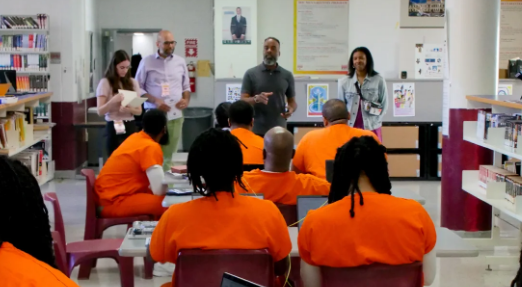Coders Behind Bars - Training for the Future
A 2020 study indicated unemployment among formerly incarcerated persons in the US is five times higher than for the general population

As many as 150 million new technology jobs could be created within the next five years, and anyone with IT skills could soon find themselves even more in demand on the jobs market. While that could be great news for anyone seeking employment, there will be a challenge filling all the vacancies. Some organizations are turning to an unexpected source of potential employees; incarcerated and formerly incarcerated people.
The leading cause for this uptick in tech jobs, of course, is the Fourth Industrial Revolution, as automation, AI and other digital technologies become more commonplace. The uptake of automation by businesses has been accelerated by the COVID-19 pandemic. Around 40 million US jobs were lost in the early stages of the crisis, with an estimated 42% believed to be gone for good.
While the Fourth Industrial Revolution is increasing the pressure to get more tech-skilled people into the global workforce, the idea of including currently incarcerated and trained persons newly released from prison in the tech sector isn’t a recent phenomenon. Back in 1998, the UK experimented with training a group of incarcerated people to help limit the expected problems of the so-called Millennium Bug. In France, prisoners are able to take classes in a range of subjects, including technology, while in Finland, all inmates have access to a training course called Elements of AI.
In 2020, unemployment among formerly incarcerated persons in the US is five times higher than for the general population, according to a study done by Amazon Web Services (AWS). The implications of this are significant—affecting not only an individual’s livelihood—but also their family and future. Research shows that post-release unemployment is the most significant predictor of eventual recidivism.
AWS is involved in Justice Through Code, a project to bring coding qualifications to formerly incarcerated persons from Columbia University’s Center for Justice and The Tamer Center for Social Enterprise at Columbia Business School. The program provides formerly incarcerated individuals with technical and interpersonal skills training, mentorship, and job placement support, with the goal to equip graduates with the skills needed for them to emerge as competitive applicants for careers in technology.
Through live instruction and coursework, participants learn the fundamentals of programming in Python. The curriculum also includes networking opportunities for participants to understand potential career pathways and gain industry connections. Participants are also provided with coaching on career and interpersonal skills including public speaking and negotiation skills, and resume writing.
Brave Behind Bars is an introductory computer science and career-readiness program for incarcerated women, based out of The Educational Justice Institute at MIT (TEJI). It’s taught both online and in-person, and the pilot program brought together 30 women from four correctional facilities across New England to study web design in 2021. In Summer 2022, the program expanded to include 40 men and women from six correctional facilities, and in 2023 the program has grown to support 55 incarcerated men and women from across the eastern United States.
Even for the students who became incarcerated more recently, it can be difficult to keep up with the fast pace of technological advances, since technical programs in correctional facilities are few and far-between. The scarcity of preparatory programs undoubtedly contributes to high and ever-rising recidivism rates.
Martin Nisser, a PhD student from MIT’s Computer Science and Artificial Intelligence Laboratory (CSAIL), explains the digital literacy and self-efficacy focused objectives. “Some of the women haven't had the opportunity to work with a computer for 25 years, and aren’t yet accustomed to using the internet. We’re working with them to build their capabilities with these modern tools in order to prepare them for life outside."
For Marisa Gaetz, a Brave Behind Bars instructor at the Washington DC Jail complex, the experience helped her understand the power of education in an entirely different perspective than her own. “Within minutes of sitting in that class my perception of incarcerated people was transformed. Someone in that class told me that before he had taken classes while incarcerated no one had believed in him. And this one time a week not only is he treated like a human being but a student and someone whose opinion matters.”










